【中考复习方案】2015届九年级英语复习课件(人教):第1课时 Starter Unit1—Unit4 Book 7A
文档属性
| 名称 | 【中考复习方案】2015届九年级英语复习课件(人教):第1课时 Starter Unit1—Unit4 Book 7A | 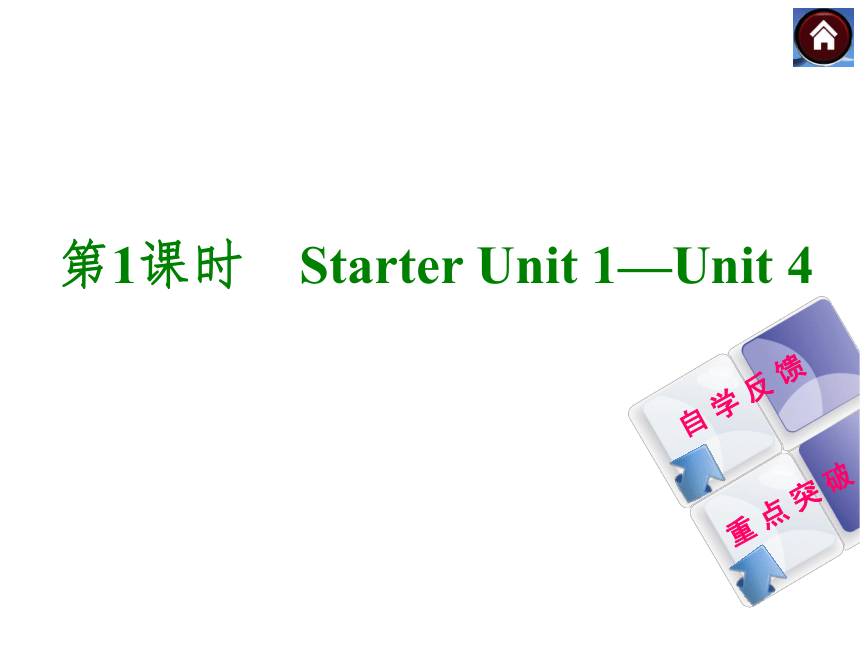 | |
| 格式 | zip | ||
| 文件大小 | 192.8KB | ||
| 资源类型 | 教案 | ||
| 版本资源 | 人教新目标(Go for it)版 | ||
| 科目 | 英语 | ||
| 更新时间 | 2014-12-04 21:55:33 | ||
图片预览

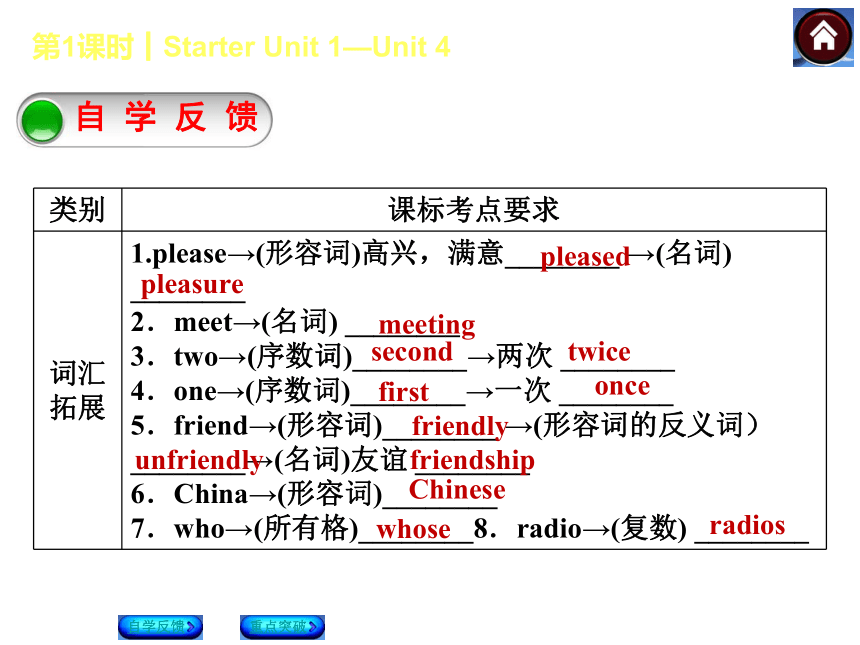
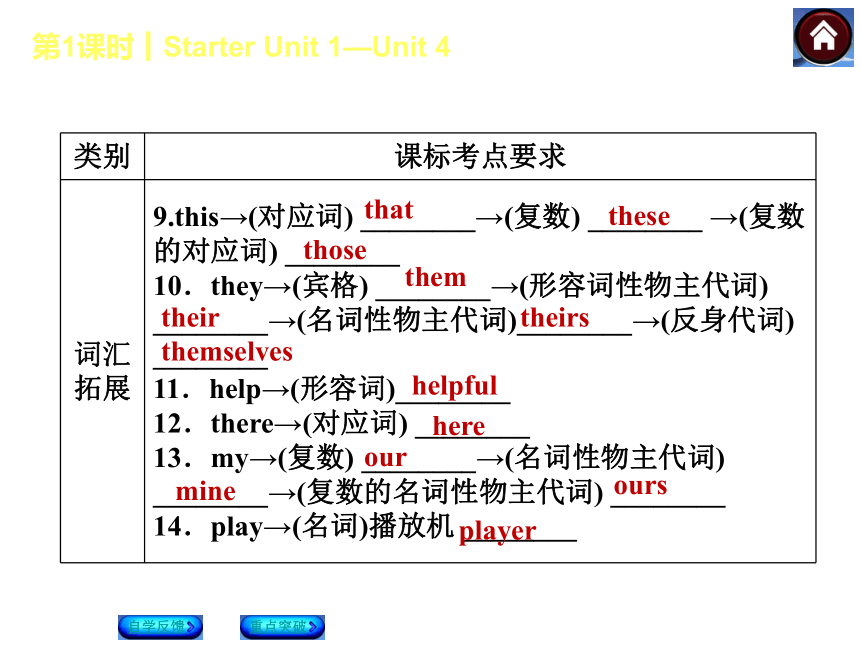
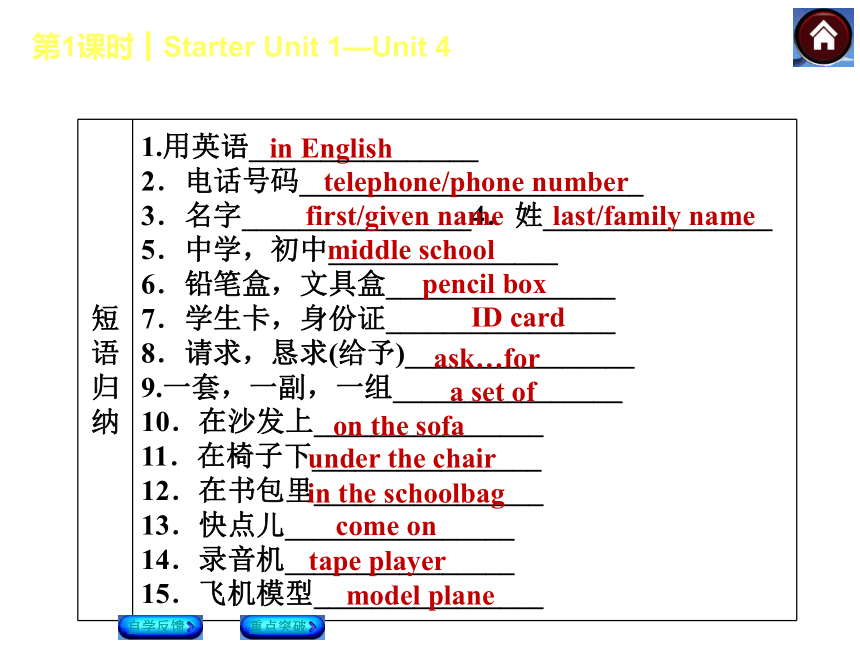
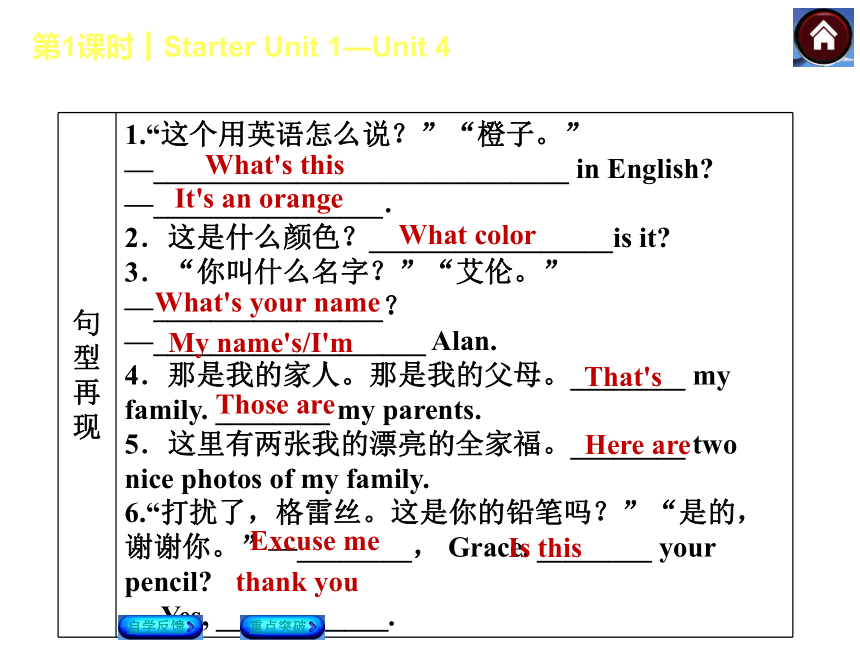
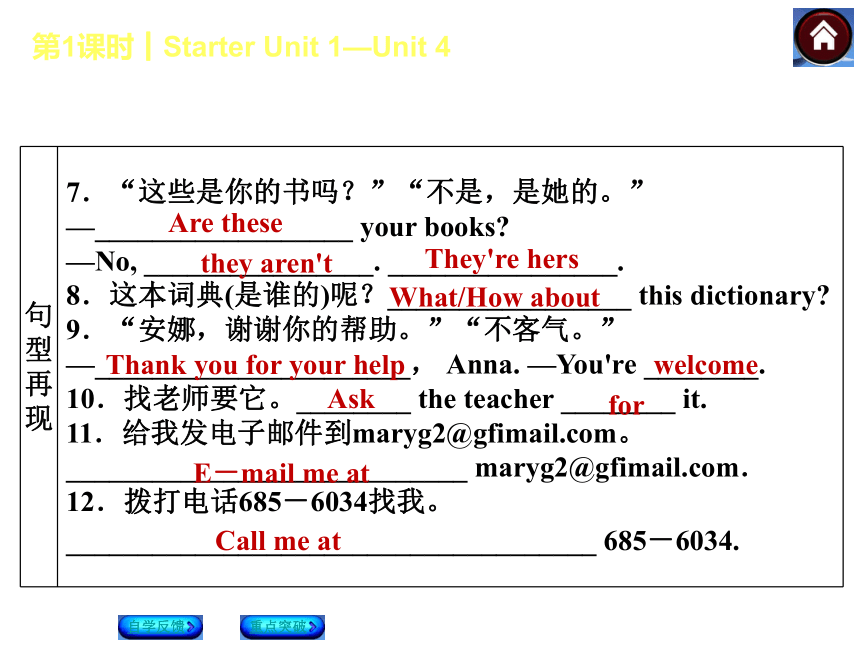
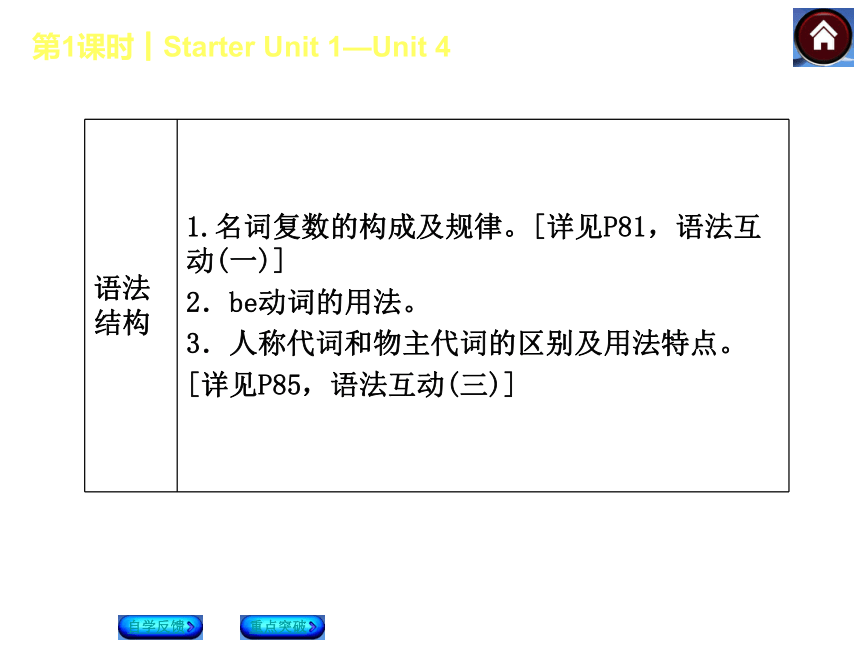
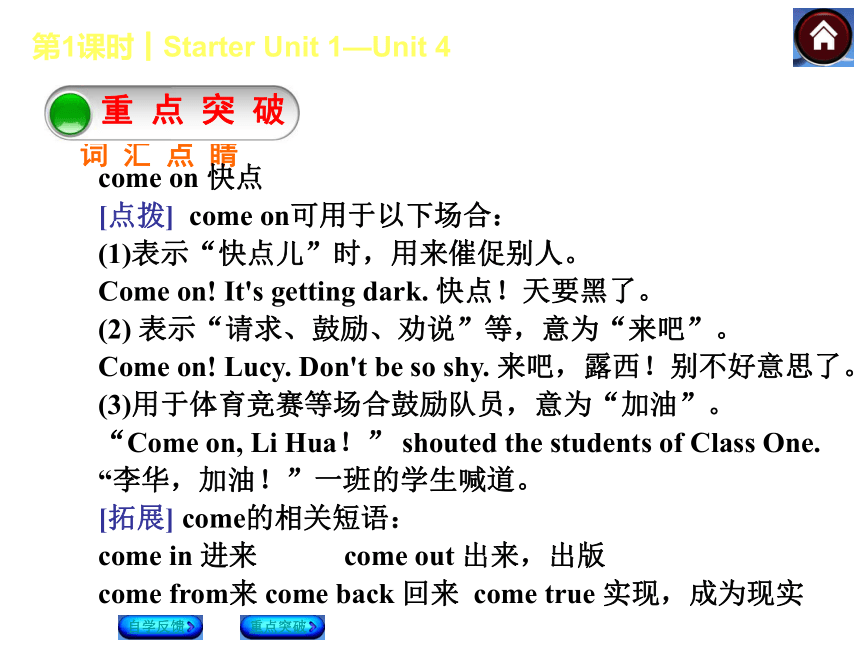
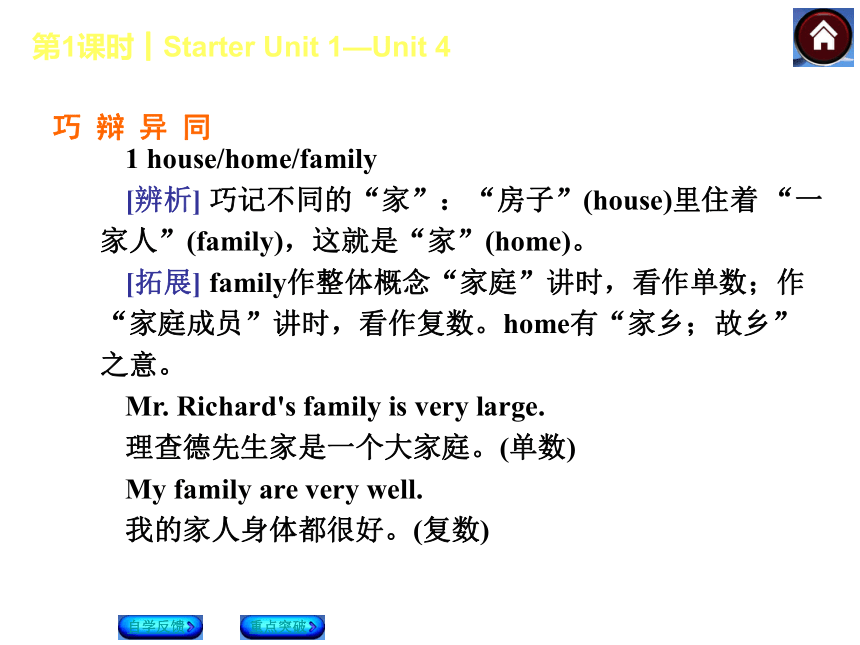
文档简介
课件24张PPT。第1课时 Starter Unit 1—Unit 4 自 学 反 馈重 点 突 破第1课时┃Starter Unit 1—Unit 4自学反馈重点突破自 学 反 馈pleasedpleasuremeeting second twicefirstoncefriendlyunfriendlyfriendshipChinesewhoseradios第1课时┃Starter Unit 1—Unit 4thatthesethosethemtheirtheirsthemselveshelpfulhere自学反馈重点突破ourmineours player第1课时┃Starter Unit 1—Unit 4in Englishtelephone/phone numberfirst/given name last/family namemiddle schoolpencil boxID cardask…fora set ofon the sofa自学反馈重点突破under the chairin the schoolbagcome ontape player model plane第1课时┃Starter Unit 1—Unit 4What's this It's an orangeWhat colorWhat's your nameMy name's/I'mThat'sThose areHere areExcuse meIs this自学反馈重点突破thank you第1课时┃Starter Unit 1—Unit 4Are these they aren'tWhat/How aboutThank you for your helpwelcomeE-mail me at Ask forCall me at自学反馈重点突破 They're hers第1课时┃Starter Unit 1—Unit 4自学反馈重点突破第1课时┃Starter Unit 1—Unit 4词 汇 点 睛come on 快点
[点拨] come on可用于以下场合:
(1)表示“快点儿”时,用来催促别人。
Come on! It's getting dark. 快点!天要黑了。
(2) 表示“请求、鼓励、劝说”等,意为“来吧”。
Come on! Lucy. Don't be so shy. 来吧,露西!别不好意思了。
(3)用于体育竞赛等场合鼓励队员,意为“加油”。
“Come on, Li Hua!” shouted the students of Class One.
“李华,加油!”一班的学生喊道。
[拓展] come的相关短语:
come in 进来 come out 出来,出版
come from来 come back 回来 come true 实现,成为现实重 点 突 破自学反馈重点突破第1课时┃Starter Unit 1—Unit 41 house/home/family
[辨析] 巧记不同的“家”:“房子”(house)里住着 “一家人”(family),这就是“家”(home)。
[拓展] family作整体概念“家庭”讲时,看作单数;作“家庭成员”讲时,看作复数。home有“家乡;故乡”之意。
Mr. Richard's family is very large.
理查德先生家是一个大家庭。(单数)
My family are very well.
我的家人身体都很好。(复数)自学反馈重点突破巧 辩 异 同第1课时┃Starter Unit 1—Unit 4中考典例[2013·河南]He was born in Italy, but he has made China his________.
A.family B.address
C.house D.homeB自学反馈重点突破D 根据but可知他把中国当成自己的故乡,故选D。解析 第1课时┃Starter Unit 1—Unit 42 one/it 自学反馈重点突破I don't like red apples. Please give me some green ones. 我不喜欢红苹果,请给我一些青苹果。
There is some water here, but it is not clean.
这里有些水,但不干净。第1课时┃Starter Unit 1—Unit 4中考典例 [2014·嘉兴] I'm looking for a bank, but I can't find ________.
A.it B.one C.this D.thatB自学反馈重点突破第1课时┃Starter Unit 1—Unit 43 good/fine/nice/well 自学反馈重点突破He cannot speak English well, but his Chinese is very good. 他英语说得不流利,但汉语说得很好。(well是副词, good是形容词)
I'm quite well. 我很健康。(well是形容词)
It is a fine day today. 今天是个好天气。(fine是形容词)第1课时┃Starter Unit 1—Unit 44 say/speak/talk/tell
(1)say强调说话的内容;还可表示“(某处)写有……”。
I can say it in English. 我能用英语说它。
(2)speak 作不及物动词时,强调说话的动作;作及物动词时,后面加语言。
The baby can't speak.这个婴儿不会说话。
Yang Lin speaks English well.
杨林英语说得很好。自学反馈重点突破第1课时┃Starter Unit 1—Unit 4(3)talk强调两个人之间的谈话,常用于talk with/to sb. (和某人交谈)和talk about sth. (谈论某事)。
She is talking with Lucy in English.
她正在和露西用英语交谈。
(4)tell意为“告诉,讲述”,后面常接双宾语。
Lucy told me the good news.
露西告诉了我这个好消息。自学反馈重点突破第1课时┃Starter Unit 1—Unit 45 look for/find/find out
(1)look for意为“寻找”,强调找的动作和过程。
(2)find意为“找到,发现”,强调找的结果。
(3)find out意为“查出,获知”,强调经过研究、调查而得知。
Can you find out what time the train will leave?
你能查出火车什么时候开吗?
I looked for my book in my schoolbag, but I couldn't find it. 我在书包里找我的书,但是没有找到。自学反馈重点突破第1课时┃Starter Unit 1—Unit 46 some/any
(1)some和any都意为“一些”,修饰可数名词复数或不可数名词。
(2)some常用在肯定句中,any多用于否定句、疑问句及条件句中。
Give me some tea.给我一些茶。
Are there any desks in the classroom?
教室里有课桌吗?
[注意] 在下列情况下应用some:
(1)在表示请求、邀请、建议的疑问句或说话人希望得到对方肯定回答的疑问句中。
(2)在肯定句中,any修饰单数可数名词时,意为“任何一个”,some修饰单数可数名词时,表示“某一个”。自学反馈重点突破第1课时┃Starter Unit 1—Unit 47 always/usually/often/sometimes/seldom/
never
频度从强到弱递减:always>usually>often>sometimes>seldom>never,具体如下:
always 总是,一直;usually 通常;often 经常,常常;sometimes 有时,不时;seldom 很少,几乎没有;never 从来不,未曾
[注意] 一般来说,频度副词通常位于be动词、助动词或情态动词之后,行为动词之前。sometimes比较活跃,还可位于句首或句尾。对频度副词提问用how often。自学反馈重点突破第1课时┃Starter Unit 1—Unit 48 Excuse me./Sorry./Pardon?
三者分别用于以下场合:自学反馈重点突破第1课时┃Starter Unit 1—Unit 41 What about this dictionary?
这本词典(是谁的)呢?
[点拨] “What/How about…?”意为“……怎么样?”,其后接名词、代词或动词-ing形式。常用在以下场合:
(1)向对方提出建议或请求。
What about going out for a walk?
出去散散步好吗?
(2)征询对方的看法或意见。
What about her playing the violin?
(你认为)她的小提琴拉的怎么样? 句 型 透 视自学反馈重点突破第1课时┃Starter Unit 1—Unit 4(3)询问天气情况或身体状况。
What about the weather in your hometown?
你家乡的天气如何?
(4)寒暄时用作承接上下文的转折语。
I am from Beijing. What about you?
我来自北京,你呢?自学反馈重点突破第1课时┃Starter Unit 1—Unit 42 Thank you for your help, Anna.
安娜,谢谢你的帮助。
[点拨] thanks for…与thank you for…同义, 表示“因……表示感谢”,介词for后接名词或动词-ing形式。
[拓展] thanks to意为“由于,多亏”,其中to为介词,并非不定式符号。自学反馈重点突破第1课时┃Starter Unit 1—Unit 4中考典例[2014·泸州]Thanks for________ me with my science.
A.Help B. to help
C. Helping D.your help自学反馈重点突破C第1课时┃Starter Unit 1—Unit 43 E-mail me at maryg2@gfimail.com.
给我发邮件到maryg2@gfimail.com。
Call me at 685-6034.
拨打电话685-6034找我。
[点拨] “e-mail sb. at+电子邮箱地址”表示“给某人发邮件到……邮箱”;“call sb. at+电话号码”表示“拨打电话……找某人”。
[拓展] call 还有“拜访”之意,常用搭配有call on +某人;call at +某地。自学反馈重点突破
[点拨] come on可用于以下场合:
(1)表示“快点儿”时,用来催促别人。
Come on! It's getting dark. 快点!天要黑了。
(2) 表示“请求、鼓励、劝说”等,意为“来吧”。
Come on! Lucy. Don't be so shy. 来吧,露西!别不好意思了。
(3)用于体育竞赛等场合鼓励队员,意为“加油”。
“Come on, Li Hua!” shouted the students of Class One.
“李华,加油!”一班的学生喊道。
[拓展] come的相关短语:
come in 进来 come out 出来,出版
come from来 come back 回来 come true 实现,成为现实重 点 突 破自学反馈重点突破第1课时┃Starter Unit 1—Unit 41 house/home/family
[辨析] 巧记不同的“家”:“房子”(house)里住着 “一家人”(family),这就是“家”(home)。
[拓展] family作整体概念“家庭”讲时,看作单数;作“家庭成员”讲时,看作复数。home有“家乡;故乡”之意。
Mr. Richard's family is very large.
理查德先生家是一个大家庭。(单数)
My family are very well.
我的家人身体都很好。(复数)自学反馈重点突破巧 辩 异 同第1课时┃Starter Unit 1—Unit 4中考典例[2013·河南]He was born in Italy, but he has made China his________.
A.family B.address
C.house D.homeB自学反馈重点突破D 根据but可知他把中国当成自己的故乡,故选D。解析 第1课时┃Starter Unit 1—Unit 42 one/it 自学反馈重点突破I don't like red apples. Please give me some green ones. 我不喜欢红苹果,请给我一些青苹果。
There is some water here, but it is not clean.
这里有些水,但不干净。第1课时┃Starter Unit 1—Unit 4中考典例 [2014·嘉兴] I'm looking for a bank, but I can't find ________.
A.it B.one C.this D.thatB自学反馈重点突破第1课时┃Starter Unit 1—Unit 43 good/fine/nice/well 自学反馈重点突破He cannot speak English well, but his Chinese is very good. 他英语说得不流利,但汉语说得很好。(well是副词, good是形容词)
I'm quite well. 我很健康。(well是形容词)
It is a fine day today. 今天是个好天气。(fine是形容词)第1课时┃Starter Unit 1—Unit 44 say/speak/talk/tell
(1)say强调说话的内容;还可表示“(某处)写有……”。
I can say it in English. 我能用英语说它。
(2)speak 作不及物动词时,强调说话的动作;作及物动词时,后面加语言。
The baby can't speak.这个婴儿不会说话。
Yang Lin speaks English well.
杨林英语说得很好。自学反馈重点突破第1课时┃Starter Unit 1—Unit 4(3)talk强调两个人之间的谈话,常用于talk with/to sb. (和某人交谈)和talk about sth. (谈论某事)。
She is talking with Lucy in English.
她正在和露西用英语交谈。
(4)tell意为“告诉,讲述”,后面常接双宾语。
Lucy told me the good news.
露西告诉了我这个好消息。自学反馈重点突破第1课时┃Starter Unit 1—Unit 45 look for/find/find out
(1)look for意为“寻找”,强调找的动作和过程。
(2)find意为“找到,发现”,强调找的结果。
(3)find out意为“查出,获知”,强调经过研究、调查而得知。
Can you find out what time the train will leave?
你能查出火车什么时候开吗?
I looked for my book in my schoolbag, but I couldn't find it. 我在书包里找我的书,但是没有找到。自学反馈重点突破第1课时┃Starter Unit 1—Unit 46 some/any
(1)some和any都意为“一些”,修饰可数名词复数或不可数名词。
(2)some常用在肯定句中,any多用于否定句、疑问句及条件句中。
Give me some tea.给我一些茶。
Are there any desks in the classroom?
教室里有课桌吗?
[注意] 在下列情况下应用some:
(1)在表示请求、邀请、建议的疑问句或说话人希望得到对方肯定回答的疑问句中。
(2)在肯定句中,any修饰单数可数名词时,意为“任何一个”,some修饰单数可数名词时,表示“某一个”。自学反馈重点突破第1课时┃Starter Unit 1—Unit 47 always/usually/often/sometimes/seldom/
never
频度从强到弱递减:always>usually>often>sometimes>seldom>never,具体如下:
always 总是,一直;usually 通常;often 经常,常常;sometimes 有时,不时;seldom 很少,几乎没有;never 从来不,未曾
[注意] 一般来说,频度副词通常位于be动词、助动词或情态动词之后,行为动词之前。sometimes比较活跃,还可位于句首或句尾。对频度副词提问用how often。自学反馈重点突破第1课时┃Starter Unit 1—Unit 48 Excuse me./Sorry./Pardon?
三者分别用于以下场合:自学反馈重点突破第1课时┃Starter Unit 1—Unit 41 What about this dictionary?
这本词典(是谁的)呢?
[点拨] “What/How about…?”意为“……怎么样?”,其后接名词、代词或动词-ing形式。常用在以下场合:
(1)向对方提出建议或请求。
What about going out for a walk?
出去散散步好吗?
(2)征询对方的看法或意见。
What about her playing the violin?
(你认为)她的小提琴拉的怎么样? 句 型 透 视自学反馈重点突破第1课时┃Starter Unit 1—Unit 4(3)询问天气情况或身体状况。
What about the weather in your hometown?
你家乡的天气如何?
(4)寒暄时用作承接上下文的转折语。
I am from Beijing. What about you?
我来自北京,你呢?自学反馈重点突破第1课时┃Starter Unit 1—Unit 42 Thank you for your help, Anna.
安娜,谢谢你的帮助。
[点拨] thanks for…与thank you for…同义, 表示“因……表示感谢”,介词for后接名词或动词-ing形式。
[拓展] thanks to意为“由于,多亏”,其中to为介词,并非不定式符号。自学反馈重点突破第1课时┃Starter Unit 1—Unit 4中考典例[2014·泸州]Thanks for________ me with my science.
A.Help B. to help
C. Helping D.your help自学反馈重点突破C第1课时┃Starter Unit 1—Unit 43 E-mail me at maryg2@gfimail.com.
给我发邮件到maryg2@gfimail.com。
Call me at 685-6034.
拨打电话685-6034找我。
[点拨] “e-mail sb. at+电子邮箱地址”表示“给某人发邮件到……邮箱”;“call sb. at+电话号码”表示“拨打电话……找某人”。
[拓展] call 还有“拜访”之意,常用搭配有call on +某人;call at +某地。自学反馈重点突破
